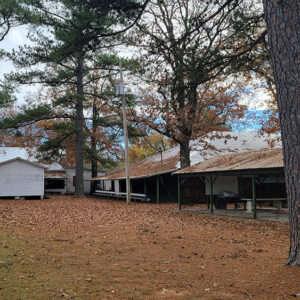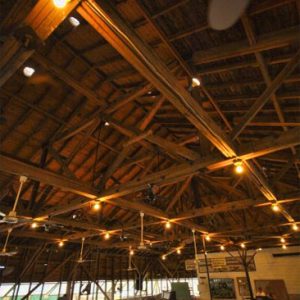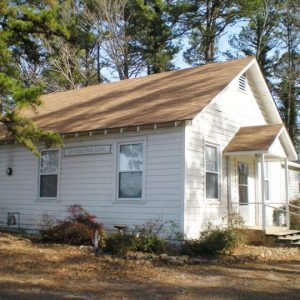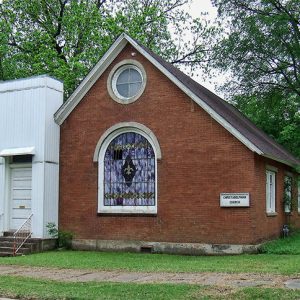calsfoundation@cals.org
Christadelphians
Christadelphians have had a presence in Arkansas since 1852, but their impact upon the state is difficult to measure. Christadelphians, following an interpretation of Christianity as basically apolitical, consider themselves to be strangers and pilgrims on the earth. Consequently, they neither individually nor as a group engage in civic affairs but await political change to be effected upon the return of Jesus Christ.
The Christadelphian movement was founded in 1847 by John Thomas, a medical doctor from London, England, who sailed to New York in 1832 and later traveled on to Cincinnati, Ohio, where he became associated with Alexander Campbell and the Restoration movement. His studies during this period led to debates with Campbell, and the two parted company. Those associated with John Thomas met in groups under various names until the Civil War. At that time, the U.S. government required a denominational designation to register for conscientious objector status. Thomas chose the name Christadelphian from the Greek for “Brethren in Christ.” In 1865, a petition was drafted to this effect but was not presented to the U.S. Congress, as the war soon ended. Thomas died in 1871.
Christadelphian doctrines are fundamentally monotheistic, Abrahamic, and millenarian, with a continuous historical interpretation of prophecy. Congregations are autonomous, having neither centralized authority nor a paid ministry. They prefer the designation of ecclesia instead of church. There are numerous ecclesias worldwide.
Early Christadelphian history in Arkansas is sketchy. The first evidence of Christadelphians in the state dates from 1852. A small group at Princeton (Dallas County) was led by David Salley and William P. Ryland. There is no record of it after 1860. In the following year, two sisters from Henderson County, Kentucky, moved, it is thought, to what is now New Edinburg (Cleveland County) on Eagle Creek, where a fledgling Christadelphian congregation had been established by 1869. Among the early converts were Dr. James and Lillie E. McDanniel. In Batesville (Independence County), W. S. Speer and H. Kemp Sanders commenced a meeting in 1870. R. S. Fugatt and George Martin were among the first to join.
By 1883, the history is more definitive. At this time, in a small community known as Georgia Settlement (Conway County), a group of farm families formed a meeting. Two years later, a member of the congregation, James Daniel Martin, erected a pavilion at Martinville (Faulkner County) for the purpose of holding Christadelphian gatherings. Originally known as Cadron Cove, the community was renamed in 1887 for Martin and his brother Captain W. W. Martin (CSA).
In 1923, a Christadelphian Bible school was established upon the Martinville site. Organizers were Ben Scroggin and S. O. Jones of Biscoe (Prairie County), Oscar L. Dunaway and Charles Martin of Conway (Faulkner County), and J. S. Martin and J. R. Frazer of Little Rock (Pulaski County). Over the years, the facility expanded, with Martin’s pavilion serving as a dining hall during annual gatherings.
In Arkansas, the Christadelphian position on conscientious objection was tested with the introduction of a national draft. Refusing conscription, members were sent to Camp Pike (now Camp Joseph T. Robinson) during World War I. Among these were Scott Huie and Orville Rogers of Choctaw (Van Buren County). During World War II, Christadelphians were sent to Camp Magnolia in Columbia County. “There were nine Christadelphians at Camp Magnolia when the tornado hit,” Ted O’Kelley wrote in a 1986 letter published in The Sanctuary-Keeper. Among Arkansas members of Camp Magnolia were O’Kelley, Shelby Lenox, Charles Ghent, and Noel Canady, who was accompanied by his wife, Dortha.
In 2015, there were Christadelphian congregations in North Little Rock (Pulaski County), Clinton (Van Buren County), Fort Smith (Sebastian County), Fayetteville (Washington County), Camden (Ouachita County), and Conway.
For additional information:
The Berean Christadelphian Ecclesial News. (Clinton Township, MI: 1998–).
The Christadelphian Advocate. (St. Peters, MO: 1885–).
Faulkner County Historical Society. Faulkner County: Its Land and People. Conway, AR: Faulkner County Historical Society, 1986.
The Sanctuary-Keeper. (Maumelle, AR: 1894–).
Bob Widding
Conway, Arkansas
 Religion
Religion Christadelphian School Grounds
Christadelphian School Grounds  Christadelphian Tabernacle
Christadelphian Tabernacle  Christadelphian Church
Christadelphian Church  Christadelphian Church
Christadelphian Church 




Comments
No comments on this entry yet.